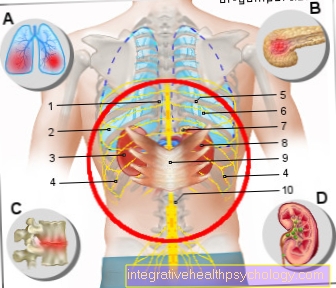NSAIDs - nonsteroidal anti-inflammatory drugs
Explanation / definition
NSAR stands for the abbreviation for the drug group of nonsteroidal anti-inflammatory drugs (NSAIDs). Non-steroidal means that there are no cortisone-containing preparations. In addition to good pain-relieving, it also has anti-inflammatory and antipyretic potency.
Active ingredient names / trade names
Active ingredient names: Ibuprofen, Diclofenac, Indomethacin, Piroxicam, Celecoxib
Trade names: Ibuprofen®, Voltaren® (Diclofenac), Indomet® (Indomethacin), Felden® (Piroxicam), Celebrex®

application areas
Typical areas of application for NSAIDs are:
- Osteoarthritis (e.g. knee osteoarthritis, hip osteoarthritis)
- Rheumatoid arthritis
- Swelling conditions after sports injuries and surgery
- Back pain
- disc prolapse
- Calcification after prosthesis implantation (hip prosthesis and knee prosthesis) = protection against heterotopic ossification
- Menstrual pain
effect
Even if NSAIDs have been in use for decades, their mode of action has still not been conclusively clarified. All NSAIDs inhibit an endogenous enzyme, the so-called cyclooxygenase. This enzyme is crucial in the formation of Prostaglanders involved.
In addition to this key enzyme, other metabolic processes, particularly around free fatty acids (especially arachidonic acid), are inhibited.
Postaglandins can be called "tissue hormones" that regulate many functions in the body.
in the central nervous system Prostaglandins regulate temperature / fever as well as pain and temperature perception.
In addition, prostaglandins have an important influence on coagulation, especially the clumping of blood platelets.
The wide range of effects also explains the greater number of potential side effects.
Through the more selective modes of action of NSAIDs, it has been possible in recent years to reduce the rate of side effects. In particular, the new groups of active ingredients that predominantly inhibit cyclooyxgenase type II (Cox-2 inhibitors), such as Vioxx, Celebrex or Bextra, could be the side effect of the Gastrointestinal bleeding can be significantly reduced. Vioxx and Bextra were due to increased Heart attack - and stroke - Risk taken off the market in the meantime.
Side effects
Allergic reaction:
- Rash (redness, itching)
- Drop in blood pressure
- shock
Bleeding in the gastrointestinal tract:
- All NSAIDs must never be taken on an empty stomach. If there is a history of a stomach or intestinal ulcer, the dose should be carefully considered by the doctor. In addition, a gastric protection preparation should be prescribed (e.g. omeprazole, pantoprazole). The risk of gastrointestinal bleeding has the following increased risk: Dicolfenac <Ibuprofen <Indomethacin
- the risk of bleeding increases, especially in combination with various NSAIDs
- NSAIDs often cause inflammation of the stomach lining. The gastric mucosal inflammation is triggered by the direct absorption of the NSAID through the stomach. But absorption in the form of a suppository can also trigger gastric mucosal inflammation via the bloodstream. However, the risk is lower here.
Liver and kidney damage:
- Long-term intake of ibuprofen can lead to liver and kidney damage. If you have liver or kidney diseases, the use of NSAIDs must be carefully checked.
If taken continuously, the liver and kidney values should be checked at regular intervals.
Edema formation: water retention in arms and legs
Psychological side effects: In rare cases, sleep disorders and psychoses can occur
Side effect stomach inflammation
The gastrointestinal side effect is very common when taking NSAIDs, which means that more than 1 in 10 people will report this side effect. Symptoms of an inflammation of the stomach include stomach pain, stomach cramps, ulceration of the stomach lining, bleeding, nausea, and vomiting. These symptoms seem to be partially harmless at first, but should by no means be underestimated. Stomach ulcers can widen into breakthroughs and require life-saving surgery. Gastric bleeding can lead to profuse blood loss. This manifests itself in fatigue, weakness, dizziness and fainting spells. Since gastric side effects are so common, gastric protection tablets should always be taken in addition to NSAIDs.
Colitis side effect
Non-steroidal anti-inflammatory drugs, or NSAIDs for short, act mainly because of their inhibitory effects on the enzymes Cyclooxygenase-1 and -2. These are two enzymes of the Prostaglandin metabolism. Prostaglandins are important messenger substances in the human body in several different organ systems. The inhibition of cyclooxygenases by NSAIDs also affects the gastrointestinal tract. Symptoms of colitis can occur.These include bowel cramps, diarrhea, constipation, and the passing of blood in the stool. Side effects caused by NSAIDs in the gut are common. This means that one to ten out of 100 people will experience the side effect of colitis.
Read more on the topic: Colon inflammation
Side effects on the kidney
By inhibiting Cyclooxygenases the salt and water balance of already damaged kidneys are particularly stressed. Chronic kidney inflammation or temporary acute kidney failure can occur. The kidneys also regulate blood pressure to a large extent. NSAIDs can lead to fluctuations in blood pressure and, as a result, to an uneven, poor blood flow to the kidneys themselves. NSAIDs also weaken the effects of antihypertensive drugs. However, side effects on the kidneys rarely occur.
Side effect bronchial asthma
Asthmatic symptoms as a side effect of taking NSAIDs occur occasionally. One to ten in 1000 people are affected. Classic symptoms such as shortness of breath, coughing, tightness in the chest and dizziness can occur. There is an interesting biochemical fact behind this side effect. NSAIDs inhibit the production of Prostaglandins. In terms of compensation, more so-called Leukotrienes formed. This in turn constrict the bronchi. The excessive production of leukotrienes therefore promotes the development of asthmatic complaints.
Interview with Mein-Allergie-Portal.com: What are NSAIDs and when do you need them?
On this topic, Dr. Nicolas Gumpert conducted an interview with mein-allergie-portal.com: "Analgesics: What are NSAIDs and when do you need them?"
NSAIDs as ointments
NSAIDs are a collective term for a wide variety of active substances, including diclofenac, ibuprofen, aspirin and methotrexate. In addition to tablets, some of them are also available as ointments or gels. This includes Diclofenac and Ibuprofen. aspirin and Methotrexate on the other hand, it is not available as an ointment, gel or cream. Diclofenac As a gel, it usually contains an active ingredient concentration of around 10 mg per gram of gel. In gels with Ibuprofen the amount of active ingredient is around 50 mg per gram of gel. That sounds like a lot. However, it should be remembered that the skin is a distinct barrier and only allows a small proportion of the active ingredient to pass through. It is therefore necessary to start with a particularly large amount of active ingredient in the gel in order to achieve a sufficient effect.
Voltaren
Voltaren® is the trade name for Diclofenac from GSK. It is the name of different medicines that contain diclofenac. Voltaren is therefore available as a gel, tablet, soft capsule, plaster and spray. In general, Voltaren is a pain medication that also has an anti-inflammatory effect. There are different areas of application and dosages, depending on the dosage form. Voltaren Gel contains 11.6 g of diclofenac per gram of gel, Voltaren forte 23.2 g per gram of gel. It is mainly used for pain in the musculoskeletal system, i.e. the joints and muscles. Likewise, the Voltaren spray, which contains 40 mg of diclofenac per gram of solution. Tablets and soft capsules contain 25 mg of active ingredient and can relieve mild to moderate pain. The maximum daily dose for diclofenac in tablet form is 200-300 mg and should not be exceeded, otherwise the likelihood of side effects increases massively. Voltaren as a patch contains 180 mg diclofenac. The advantages of patches are the continuous, long-term release of the drug and their local effect. This means that the active ingredient only works where the plaster sticks. It lasts for a longer period of time and therefore rarely needs to be changed.
Ibuprofen
Ibuprofen is also one of the non-steroidal anti-inflammatory drugs and belongs together with Ketoprofen and Naproxen to the group of Aryl propionic acids. Non-steroidal means that the medication does not contain cortisone. It is used for mild to moderate, acute and chronic pain, as well as chronic inflammatory diseases. Ibuprofen is particularly useful for toothache, migraines, back pain and menstrual pain. Since it is a non-steroidal anti-inflammatory drug, it can cause gastrointestinal side effects or asthmatic symptoms (see section above). However, ibuprofen in particular causes side effects on the kidneys, which is why ibuprofen should never be taken by people with kidney failure or by people who have had a kidney transplant. The maximum daily dose is 1200 mg or 1.2 g. In addition, this maximum daily dose should not be taken for more than three to five days without consulting a doctor. Ibuprofen is available from various companies under several trade names, for example from Hexal, Ratiopharm or Johnson & Johnson GmbH. The most common dosages are 400 mg, 600 mg, or 800 mg ibuprofen per tablet. There are also preparations that also contain lysine, an amino acid. These are 400 mg tablets to which lysine is added. The amino acid accelerates the absorption of ibuprofen into the body, which results in a faster onset of action after just 20-30 minutes. Ibuprofen 400 mg can be bought in pharmacies without a prescription, while tablets with 600 mg and 800 mg require a prescription from a doctor. Ibuprofen is only available in pharmacies, so it cannot be bought in drugstores or other similar shops.
The Proff® pain cream contains ibuprofen as an active ingredient. For more information on this non-steroidal drug, see: Proff® pain cream
Interactions
Cortisone / Cortisone:
- with simultaneous administration of cortisone, the risk of bleeding in the gastrointestinal tract increases considerably
Anticoagulant:
- NSAIDs should not be given at the same time as anticoagulant preparations or preparations of the same class of active substances (diclofenac / indomethacin / piroxicam / ibuprofen).
Particularly when Marcumar is administered at the same time, it should be taken into account that the blood-thinning effect of Marcumar increases.
Contraindications
Contraindications for NSAIDs are:
- an existing one Gastric ulcer or colon ulcer
- a history of multiple stomach or intestinal ulcers
- bronchial asthma
- known Liver disease
- known Kidney disease
- pregnancy (varies depending on the section) or breastfeeding
- Back pain
- Painkiller
A list of all medications can be found under: Medication A-Z
Exclusion of liability / disclaimer
We would like to point out that medication must never be discontinued, applied or changed independently without consulting your doctor.
Please note that we cannot claim that our texts are complete or correct. The information may be out of date due to current developments.





















.jpg)







